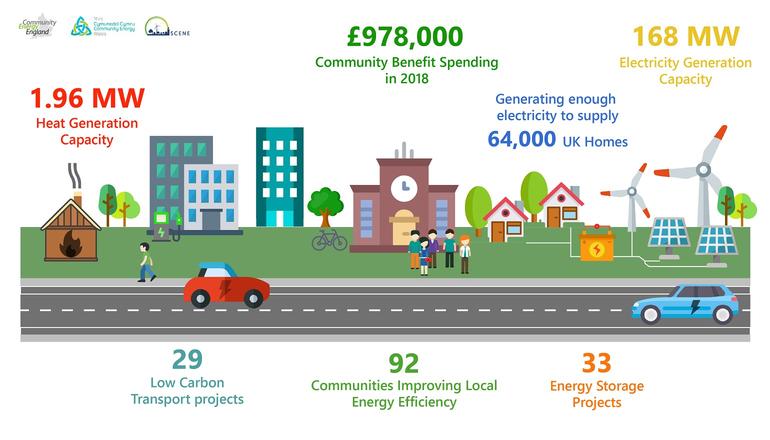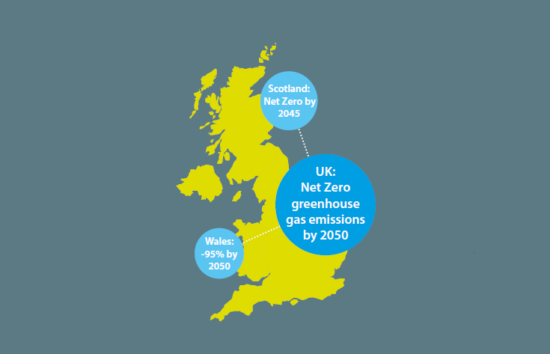News
Committee on Climate Change: UK Credibility Rests on Government Action in Next 18 Months
Thu, 1 August 2019Following recent news that the UK has legislated for net-zero emissions by 2050 (compared to our old target of 80% by 2050), the Committee on Climate Change (CCC) has called on the UK government to show it is serious about its legal obligations to tackle and prepare for climate change.
The CCC published two new reports on reducing emissions and preparing for climate change impacts in which it says that UK action to curb greenhouse gas emissions is lagging far behind what is needed, even to meet previous, less stringent, emissions targets. Over the past year, the Government has delivered just 1 of 25 critical policies needed to get emissions reductions back on track. Meanwhile, action to prepare our homes, businesses and natural environment for a warming world is less ambitious than it was ten years ago. Of 33 key sectors assessed by the Committee, none show good progress when it comes to managing climate change risk.
Lord Deben, CCC Chairman, said: “The UK is the first major economy to set a net-zero emissions target and intends to host the world’s leaders at next year’s landmark climate conference (COP26). These are historic steps forward and position the UK at the forefront of the global low-carbon transition. But international ambition does not deliver domestic action. It’s time for the Government to show it takes its responsibilities seriously. Reducing emissions to net zero by 2050, requires real action by Government now.”
New Report Shows 2018 Was the Toughest Year Yet for Community Energy
Thu, 1 August 2019The third annual Community Energy – State of the Sector report shows that 2018 was the toughest year yet for community-owned energy, with new generation capacity falling steeply in comparison to previous years. In 2018 just 7.9 MW of new community energy capacity was installed, including 0.7 MW across four micro hydro schemes and 7.2 MW across 47 new solar sites, compared to 33.5 MW of new community energy capacity in 2017.

Emma Bridge, Chief Executive of Community Energy England, the membership body representing over 200 community energy groups and organisations that support and work with the sector said: “The impact of central Government policy on the Community Energy sector is stark – the removal of subsidies like the Feed-In Tariffs; continued planning restrictions around on-shore wind; and still no Social Investment Tax Relief for those willing to invest in community energy projects have severely impacted the sectors ability to create financially viable energy generation schemes.
‘But Community Energy is about much more than renewable energy generation. Local groups have been resiliently working on new ways to ensure that communities can carry out practical climate action. This year we’ve seen a greater focus on energy efficiency programmes and electric vehicles, as well as schemes investigating flexibility services, demand side response, local energy supply and peer-to-peer (P2P) trading. And we must not forget that community energy schemes even in these difficult circumstances are still generating enough electricity to power 64,000 homes; that’s something we are very proud of.’
http://bit.ly/2YOK0nJ
Training and Events for Climate Change-focused Community Groups
Fri, 28 June 2019We'd like your opinion on what events and/or training we should provide in the next nine months to best support you in the important work you are all doing. Please take two minutes to help us decide by filling out this short survey: https://us7.campaign-archive.com/?u=a3462e33d801fa085b0123db1&id=5021fcd514
A couple of options:
Carbon Literacy Course

We recently discovered this great course which would equip you and your community to get to grips with how to bring about the rapid reduction in carbon emissions required in the next few years. We think it could also be great for Town and Parish councils that have recently declared climate emergencies.
Carbon Literacy Courses are nationally-accredited but tailored to their audience and the location they run in. Ours would be tailored to communities and to the geographical area the CCAN covers.
The course covers knowledge and skills around areas including:
- The science behind climate change
- Social equity & climate change
- What you can do to act on climate change
- Strategies and skills for communicating action on climate change
We're already planning a version of this course for city, county and district level local authorities in the area.
Would you like us to run this course? Fill in the survey.
Networking Events

We last held networking events back in March and they were really popular. Lots of us came together to share:
- News of our many and diverse projects and campaigns
- Thoughts on our successes and challenges
- A workshop about how we sustain our groups so that they thrive in the long term
- Time for informal conversations and networking
- Some amazing food at the bring-and-share lunch!
Want us to run this kind of event again? Fill in the survey.
List of Climate Emergencies Declared Grows
Fri, 28 June 2019
The following local authorities in Derby, Derbyshire, Nottingham and Nottinghamshire have now declared a climate emergency (please let us know if we’ve missed anyone):
- Derbyshire Dales District Council
- Rushcliffe Borough Council
- Nottingham City Council
- Derby City Council
- Wirksworth Town Council
- Hayfield Parish Council
- Belper Town Council
Meanwhile, Derbyshire County Council has published a Derbyshire Climate and Carbon Reduction Manifesto with the aim of becoming carbon neutral.
In the coming weeks the following councils will all debate motions to declare an emergency: Amber Valley BC, High Peak BC, North East Derbyshire DC and Chesterfield BC.
Committee on Climate Change: UK Should be Zero Carbon by 2050
Tue, 14 May 2019
The UK can end its contribution to global warming within 30 years by setting an ambitious new target to reduce its greenhouse gas emissions to zero by 2050, according to a report published by the Committee on Climate Change (CCC) earlier this month.
Ten years after the Climate Change Act became law, the CCC believes now is the right moment to set a more ambitious goal. Achieving a ‘net-zero’ target by the middle of the century is in line with the UK’s commitment under the Paris Agreement; the pact which the UK and the rest of the world signed in 2015 to curb dramatically the polluting gases that cause climate change.
This is a crucial time in the global effort to tackle climate change. Global average temperature has already risen by 1°C from pre-industrial levels, driving changes in our climate that are increasingly apparent. In the last ten years, pledges to reduce emissions by the countries of the world have reduced the forecast of global warming from above 4°C by the end of the century to around 3°C. Net-zero in the UK would lead the global effort to further limit the rise to 1.5°C.
The CCC’s recommended targets are achievable with known technologies, alongside improvements in people’s lives, and should be put into law as soon as possible, the Committee says. Falls in cost for some of the key zero-carbon technologies mean that achieving net-zero is now possible within the economic cost that Parliament originally accepted when it passed the Climate Change Act in 2008.
Meanwhile, The Climate Coalition (see next item) believes we could reach net zero by 2045 and Extinction Rebellion is calling it for to met by 2025.
